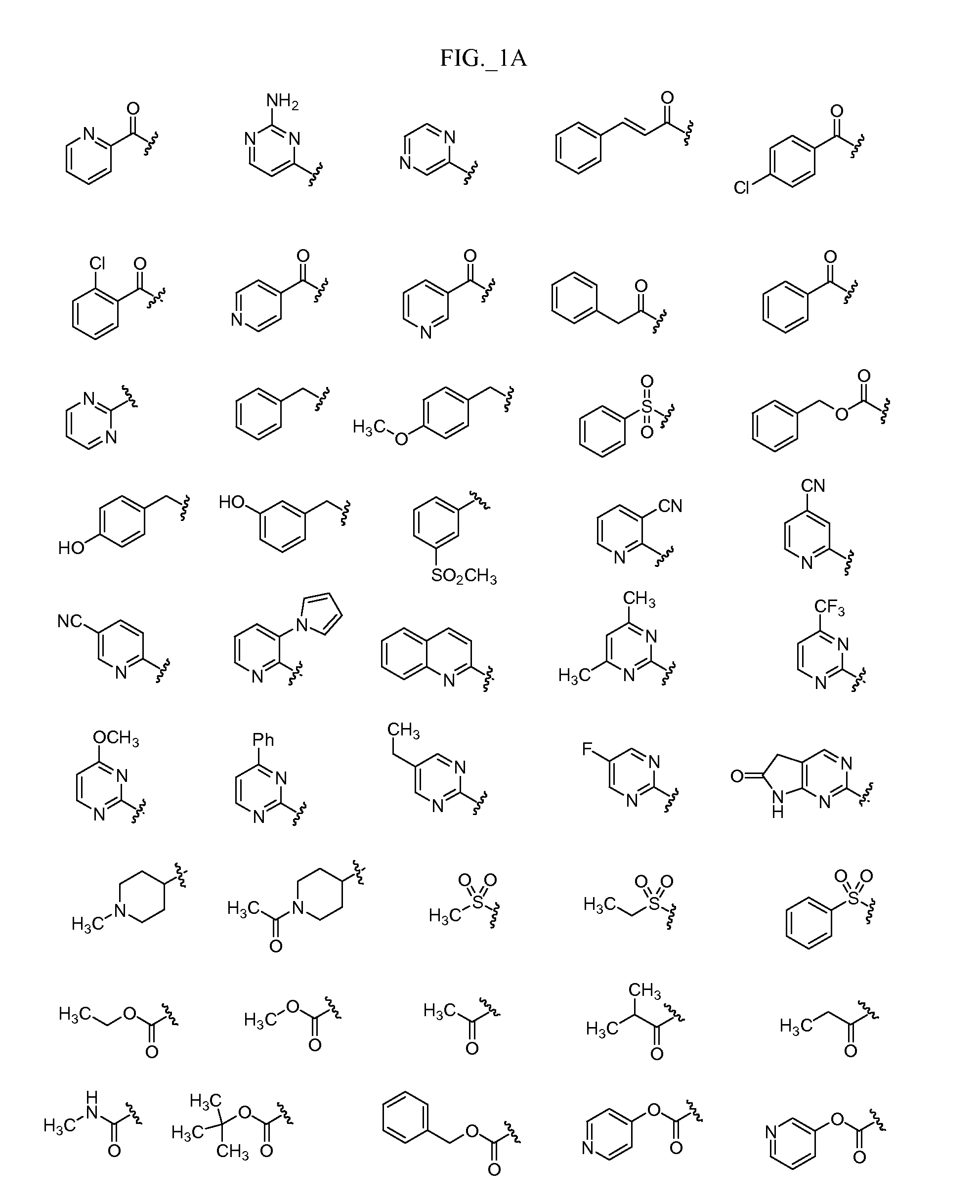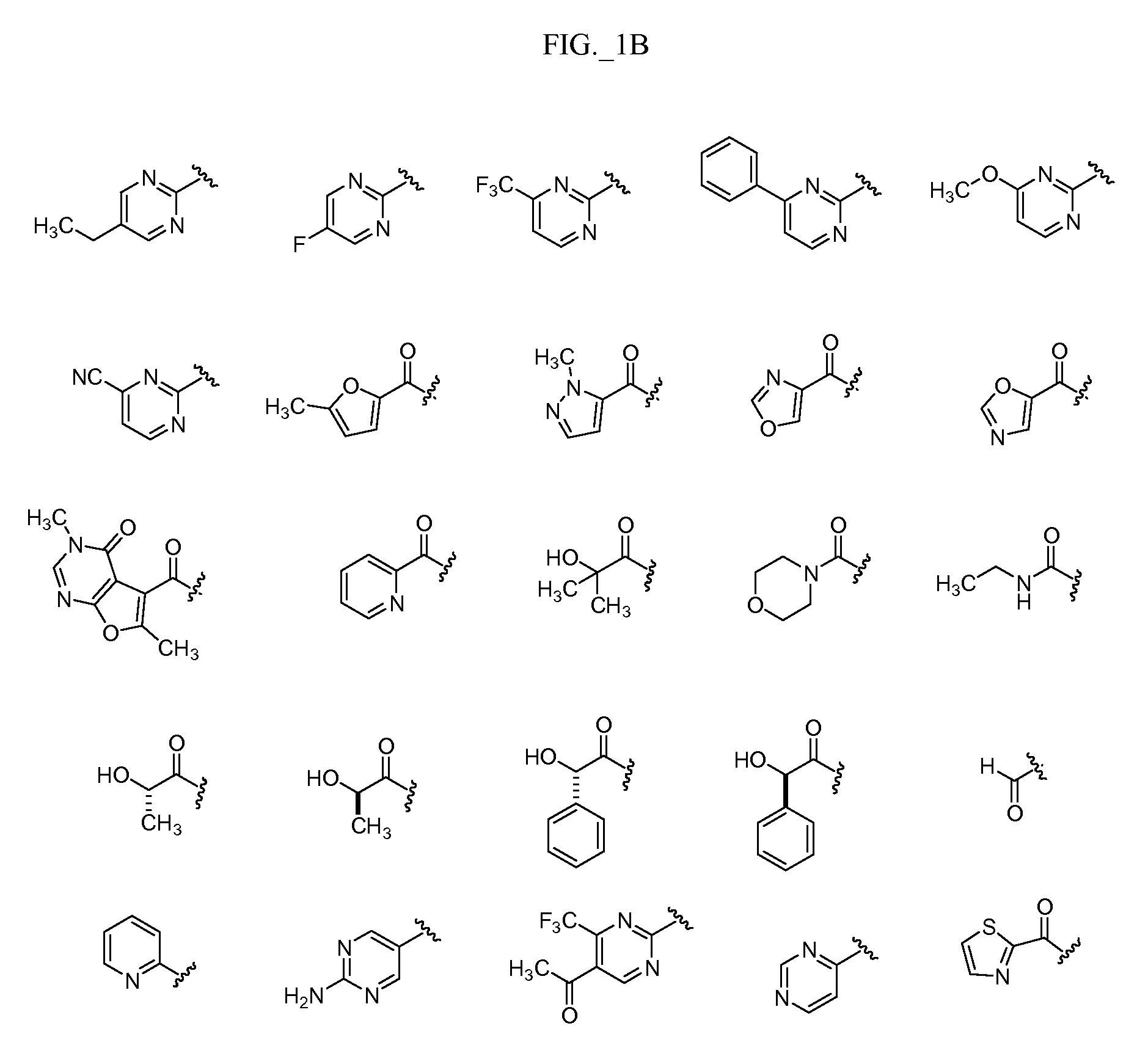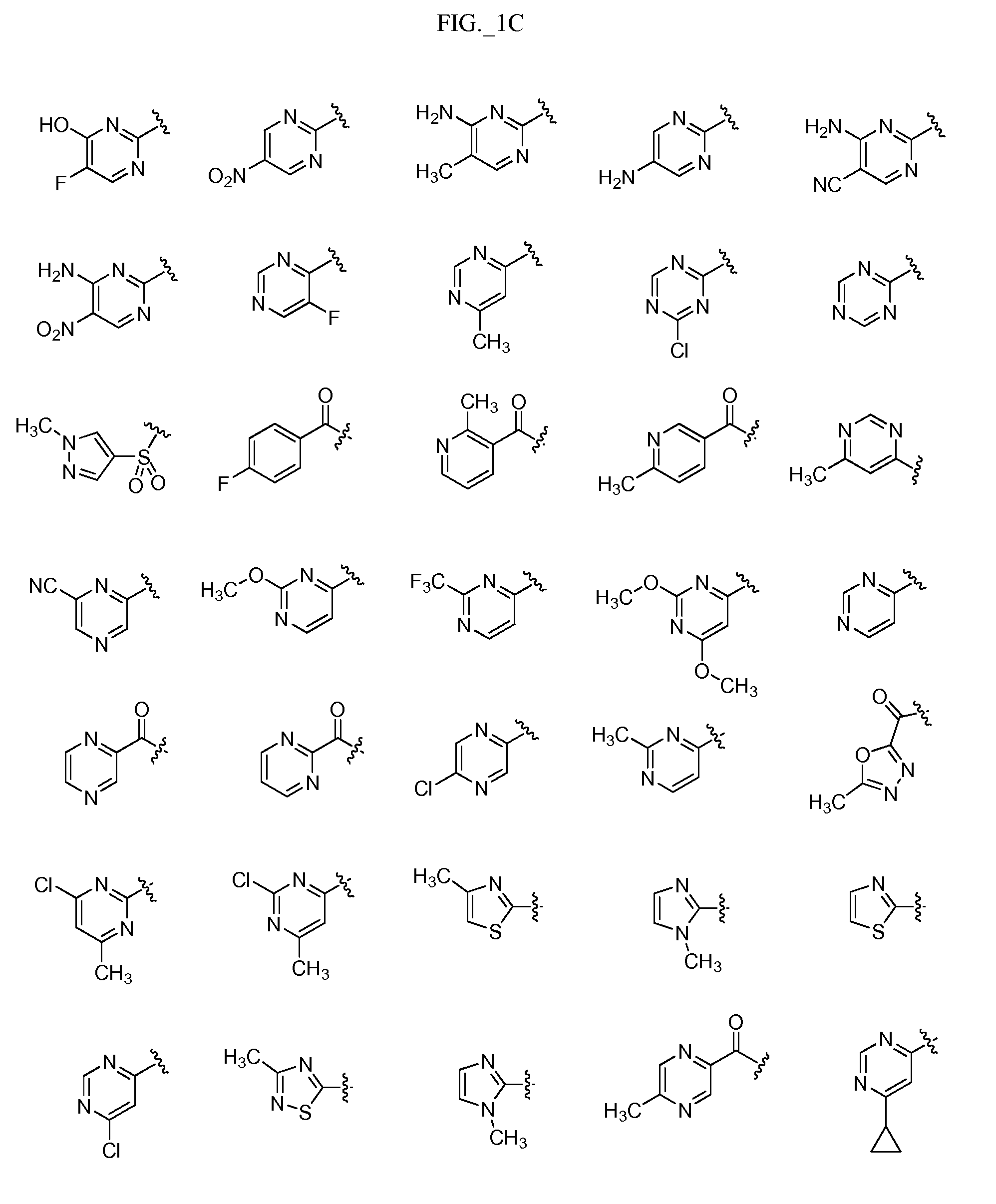Pyrimidine compounds, compositions and methods of use
a technology of pyrimidine compounds and compositions, applied in the field of pyrimidine compounds, compositions and methods of use, can solve the problems of hyperactivation of downstream targets like mtor kinase, and achieve the effect of inhibiting the activity of mtor kinas
- Summary
- Abstract
- Description
- Claims
- Application Information
AI Technical Summary
Benefits of technology
Problems solved by technology
Method used
Image
Examples
example 1
[0206]
[0207]Step 1—Synthesis of b: To a mixture of tert-butyl 2,4-dichloro-5H-pyrrolo[3,4-d]pyrimidine-6(7H)-carboxylate (1.2 g, 4.1 mmol) and i-PrN2Et (1.4 mL, 8.3 mmol) in isopropanol (8 mL) was added morphorline (0.430 mL, 5.0 mmol). The mixture was stirred at room temperature until the reaction was done (˜1 hr). The mixture was concentrated in vacuo and the resulting residue was purified by flash column chromatography (40% EA / Hex) to give tert-butyl 2-chloro-4-morpholino-5H-pyrrolo[3,4-d]pyrimidine-6(7H)-carboxylate (b) (1.378 g, 98%).
[0208]Step 2—Synthesis of c: Compound b (0.366 mmol), (4-ethylureido)phenylboronic acid pinacol ester (0.439 mmol), tetrakis(triphenylphosphine)palladium (0.022 mmol), 1 M aq. KOAc (0.55 mL), 1 M aq. Na2CO3 (0.55 mL) and MeCN (2 mL) were mixed in a microwave reaction tube. The mixture was heated in a microwave reactor at 120° C. for 25 min. The mixture was extracted with EtOAc (3×) and the combined organic extract was concentrated. The resulting re...
example 2
[0210]
[0211]Synthesis of compound e: 1-Ethyl-3-(4-(4-morpholino-6,7-dihydro-5H-pyrrolo[3,4-d]pyrimidin-2-yl)phenyl)urea (d, 0.15 mmol), chloropyrimidine (0.21 mmol) and i-PrN2Et (0.6 mmol) were mixed in DMF (0.6 mL) in a microwave reaction tube. The mixture was heated to 120° C. and stirred for 15 min. After cooling to room temperature, the mixture was diluted with DMF. The resulting mixture was purified by reverse-phase HPLC to give 1-ethyl-3-(4-(4-morpholino-6-(pyrimidin-2-yl)-6,7-dihydro-5H-pyrrolo[3,4-d]pyrimidin-2-yl)phenyl)urea (e): 1H NMR (500 MHz, DMSO) δ 8.71 (s, 1H), 8.47 (d, J=4.8, 2H), 8.21 (d, J=8.8, 2H), 7.51 (d, J=8.8, 2H), 6.77 (t, J=2.5, 1H), 6.18 (m, 1H), 4.99 (s, 2H), 4.68 (s, 2H), 3.78 (m, 8H), 3.20-3.15 (m, 2H), 1.26 (t, J=6.9, 3H); LC-MS: m / z=+447 (M+H)+.
example 3
[0212]
[0213]Synthesis of 1-(4-(6-(2-aminopyrimidin-4-yl)-4-morpholino-6,7-dihydro-5H-pyrrolo[3,4-d]pyrimidin-2-yl)phenyl)-3-ethylurea (ee): The title compound was prepared by the procedure described in Example 2, by substituting chloropyrimidine with 2-amino-4-chloropyrimidine: 1H NMR (500 MHz, DMSO) δ 8.71 (s, 1H), 8.21 (dd, J=3.9, 8.8, 2H), 7.94 (t, J=7.5, 2H), 7.49 (dd, J=2.1, 8.7, 1H), 6.67-6.34 (m, 1H), 6.25-6.17 (m, 1H), 5.06 (s, 2H), 4.86-4.65 (m, 2H), 3.76 (m, 8H), 3.24-3.04 (m, 3H), 1.06 (t, J=7.2, 3H). LC-MS: m / z=+462 (M+H)+.
PUM
 Login to View More
Login to View More Abstract
Description
Claims
Application Information
 Login to View More
Login to View More - R&D
- Intellectual Property
- Life Sciences
- Materials
- Tech Scout
- Unparalleled Data Quality
- Higher Quality Content
- 60% Fewer Hallucinations
Browse by: Latest US Patents, China's latest patents, Technical Efficacy Thesaurus, Application Domain, Technology Topic, Popular Technical Reports.
© 2025 PatSnap. All rights reserved.Legal|Privacy policy|Modern Slavery Act Transparency Statement|Sitemap|About US| Contact US: help@patsnap.com



